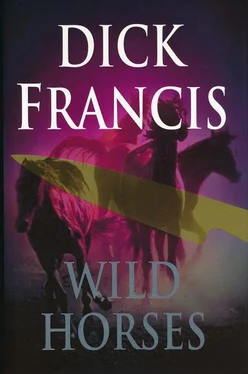‘It can’t be helped,’ I said. ‘I’m running late. Is everyone there? Well, get some drinks sent over. Keep them happy, but don’t let Jimmy have more than two G and Ts, and make sure we have enough copies of the script alterations. Right? Good. See you.’
I regretted having to leave Dorothea at such a time, but in fact I’d squeezed my visit into a day’s schedule that had made no provision for it, keeping the promise I’d given week after week.
Three months back, in the preliminary pre-production stage of the film I was currently engaged on, I’d called to see Valentine as a brief matter of courtesy, a gesture to tell him I remembered him in the old days in my grandfather’s time, and had always admired, even if from a distance, his emergence as a sage.
‘Sage my foot!’ He’d disclaimed the flattery but enjoyed it all the same. ‘I can’t see very well these days, boy. How about reading to me for a bit?’
He lived on the outer edge of Newmarket, the town long held to be the home and heart of the horseracing industry worldwide. ‘Headquarters’, the racing press called it. Fifteen hundred of the thoroughbred élite rocketed there over the windswept training gallops and over the wide difficult tracks, throwing up occasional prodigies that passed their glorious genes to flying generations of the future. An ancient wealth-producing business, the breeding of fast horses.
I was on the point of leaving when the front doorbell rang, and to save Dorothea’s tired feet I went to answer it.
A short thirtyish man stood there looking at his watch, impatient.
‘Can I help you?’ I asked.
He gave me a brief glance and called past me, ‘Dorothea?’
Regardless of fatigue, she appeared from Valentine’s room and said miserably, ‘He’s... in a coma, I think. Come in. This is Thomas Lyon who’s been reading to Valentine, like I told you.’ As if on an afterthought, she finished the introduction, flapping a hand and saying, ‘Robbie Gill, our doctor.’
Robbie Gill had red hair, a Scots accent, no small-talk and a poor bedside manner. He carried a medical bag into Valentine’s room and snapped it open. He rolled up the ill man’s eyelids with his thumb and pensively held one of the fragile wrists. Then he silently busied himself with stethoscope, syringes and swabs.
‘We’d better get him to bed,’ he said finally. No mention, I was glad to notice, of transportation to hospital.
‘Is he—?’ Dorothea asked anxiously, leaving the question hovering, not wanting an affirmative answer.
‘Dying?’ Robbie Gill said it kindly enough in his brusque way. ‘In a day or two, I’d say. Can’t tell. His old heart’s still fairly strong. I don’t really think he’ll wake again, but he might. It partly depends on what he wants.’
‘How do you mean, what he wants?’ I asked, surprised.
He spent time answering me, chiefly, I thought, for Dorothea’s sake, but also from a teacher’s pleasure in imparting technical information.
‘Old people,’ he said, ‘very often stay alive if there’s something they particularly want to do, and then after they’ve done it they die quite quickly. This week I’ve lost a patient who wanted to see her grandson married. She went to the wedding and enjoyed it, and was dead two days later. Common occurrence. If Valentine has no unfinished business, he may slip away very soon. If he were looking forward to receiving another award, something like that, it might be different. He’s a strong-willed man, and amazing things can happen even with cancer as advanced as this.’
Dorothea shook her head sadly. ‘No awards.’
“Then let’s get him settled. I’ve arranged for Nurse Davies to pop in late this evening. She’ll give him another injection, which will keep him free from any pain he might feel in the night, and I’ll come back first thing in the morning. The old codger’s beaten me, dammit. He’s got his way. I’ll not move him now. He can die here at home.’
Dorothea’s tears thanked him.
‘It’s lucky he has you,’ the doctor told her, ‘and don’t make yourself ill.’ He looked from her to my height assessingly, and said, ‘You look bigger than both of us. Can you carry him? Nurse Davies would help Dorothea move him, as she always does, but usually he’s conscious and doing his best to walk. Can you manage him on your own?’
I nodded. He weighed pathetically little for a man once as strong as horses. I lifted the tall sleeping figure in my arms and carried him from his armchair, through the small hallway and into his bedroom, putting him down gently on the white sheet, revealed by Dorothea peeling back the bed covers. Her brother’s breathing rasped. I straightened his pyjamas and helped Dorothea cover him. He didn’t wake. He had died inside, I thought, from the moment he’d believed in his absolution.
I didn’t bring up the subject of a priest again with Dorothea, nor mention it to the doctor. I was convinced they would both disapprove of what I’d done, even though Valentine was now dying in peace because of it. Leave things as they are, I decided. Don’t add to Dorothea’s distress.
I kissed the old lady, shook hands with the doctor and, offering vague but willing future help, drove back to my job.
Life, both real and imaginary, was loud and vigorous along in Newmarket, where the company I was working for had rented an empty racing stable for three months, paying the bankrupt owner-trainer enough to keep him in multiple child-support forever.
Although a good hour late for the script conference I’d called for five-thirty, I did not apologise, having found that the bunch I was working with took regrets for weakness, chiefly because of their own personal insecurities. It was essential, I understood, for them to regard me as rock, even if to myself sometimes the rock was no more durable than compressed sand.
They were gathered in what had earlier been the dining — room of the trainer’s cavernous house (all the furniture having passed under the bankruptcy hammer, satiny green and gold striped paper still adhering richly to the walls) and were variously draped round a basic trestle table sitting on collapsible white plastic garden chairs on the bare boards of the floor. The drinks provided by the catering unit had barely lasted the hour: no one on the production was wasting money on excess comfort.
‘Right,’ I said, ousting Ed from the seat I wanted, half way along one side of the table, ‘have you all read the alterations and additions?’
They had. Three were character actors, one a cinematographer, one a production manager, one a note-taker, one an assistant director — Ed — and one a scriptwriter that I would like to have done without. He had made the current changes at my reasonable insistence, but felt aggrieved. He believed I was intent on giving a slant to the story that departed at ninety degrees from his original vision.
He was right.
It was disastrously easy to make bad horseracing pictures and only possible to do it at bankable level, in my view, if racing became the framing background to human drama. I’d been given the present job for three reasons that I knew of, the third being that I’d previously stood two animal stories on their heads with profitable results, the second being that I’d been trained in my work in Hollywood, the source of finance for the present epic, and — first — that I’d spent my childhood and teens in racing stables and might be considered to know the industrial terrain.
We were ten days into production: that is to say we had shot about one-sixth of the picture, or, putting it another way, roughly twenty minutes a day of usable footage, whole cloth from which the final film would be cut. We’d been scheduled to finish in sixty working days; a span of under ten weeks, as rest days were precious and rare. I, as director, decided which scenes would actually be shot on which days, though I’d made and distributed in advance a programme to which we mostly adhered.
Читать дальше












